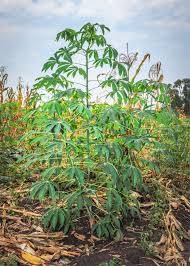The Uses and Importance of the Cassava Plant
Cassava, scientifically known as Manihot esculenta, is a root vegetable that plays a crucial role in the diets and economies of many countries, particularly in Africa, Asia, and South America. Known for its versatility and resilience, cassava is a vital crop for food security and economic development in many regions.
Nutritional Value
Cassava is primarily known for its starchy tubers, which are rich in carbohydrates. This makes it a staple food in many tropical countries. A 100-gram serving of raw cassava provides about 160 calories, predominantly from carbohydrates. While cassava is low in protein and essential nutrients, it is an excellent source of energy, making it an essential food source for populations in regions where other staples may be scarce. When properly processed and cooked, cassava can be a nutritious addition to the diet, providing dietary fiber, vitamin C, and some B vitamins.
Economic Importance
Cassava is not only a vital food source but also an important cash crop. It can thrive in poor soils and is resistant to drought, making it an ideal crop in areas with challenging agricultural conditions. Farmers can cultivate cassava with relatively low input costs, and its ability to grow in diverse environments makes it a reliable source of income for many smallholder farmers.
In addition to providing direct economic benefits, cassava also supports various industries. It is used to produce starch, flour, and biofuels, contributing to the economy in multiple ways. The starch extracted from cassava is utilized in food products, textiles, paper, and pharmaceuticals, showcasing the crop's versatility.
Culinary Uses
Cassava is consumed in various forms around the world. In many African countries, it is processed into fufu, a dough-like dish served with soups and stews. In Brazil, cassava is transformed into farofa, a toasted flour used as a side dish. In Asia, it is often used to make tapioca pearls, a popular ingredient in desserts and beverages.
The roots can be boiled, fried, or baked, offering diverse culinary applications. The leaves of the cassava plant are also edible and are often used in salads or cooked as a vegetable, providing additional nutritional benefits. However, it's crucial to note that cassava must be properly processed to eliminate toxins present in its raw form, particularly in bitter varieties.
Food Security and Resilience
As global populations continue to grow, food security is a pressing concern. Cassava's ability to thrive in suboptimal conditions makes it a reliable food source in regions prone to climate variability. It can be harvested throughout the year, ensuring a steady food supply even during periods of drought or other agricultural challenges.
Moreover, cassava can be a crucial crop in the face of changing climate patterns. Its resilience to extreme weather conditions allows farmers to maintain production levels even when other crops fail. This adaptability is vital for sustaining local food systems and enhancing food security in vulnerable communities.
Research and Development
Ongoing research into cassava is expanding its potential benefits. Scientists are working on developing high-yield and disease-resistant cassava varieties to improve productivity and reduce crop losses. Biotechnological advances are also being explored to enhance the nutritional profile of cassava, making it a more complete food source. Initiatives aimed at improving processing methods are helping to minimize toxin levels and maximize nutritional benefits.
Conclusion
The cassava plant stands as a beacon of food security and economic stability for millions around the world. Its versatility in culinary uses, economic potential, and resilience to adverse growing conditions make it an essential crop for the future. As global challenges such as climate change and food insecurity continue to loom, the importance of cassava will only grow. With continued research and support for farmers, cassava can play a pivotal role in ensuring sustainable food systems and enhancing the livelihoods of those who depend on it.




No comments yet
Be the first to share your thoughts!